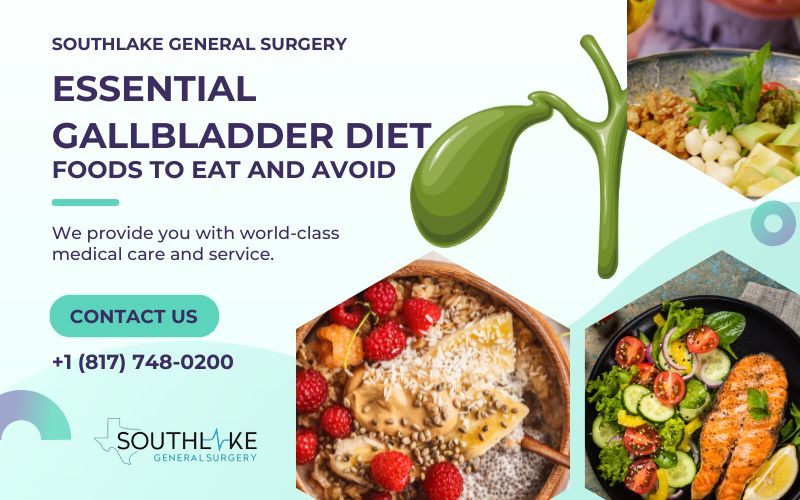Essential Gallbladder Diet focuses on incorporating foods that promote digestive wellness and alleviate stress on the gallbladder. Your gallbladder helps with digestion, but we often forget to think about its health until there’s a problem. To keep your gallbladder healthy, eat a balanced diet.
Eating a balanced diet can lower risk factors and assist in preventing problems like gallstones and inflammation. Unhealthy eating patterns, rapid weight loss, and high-fat foods can negatively impact gallbladder performance.
This shows the need to make smart food choices. If you have gallbladder disease or want to avoid issues, following a gallbladder-friendly eating plan is important. This is key for long-term digestive health.
Key Highlights
- For optimal gallbladder health, incorporate a diverse range of foods such as fruits, vegetables, whole grains, and lean proteins into your diet.
- You should avoid fatty foods, sweets, and refined carbs. This helps lower strain on the gallbladder and prevents problems.
- To help with digestion and increase bile flow, include healthy fats like avocado, almonds, and olive oil.
- Keeping regular meal times and following diets like Mediterranean or DASH can help your gallbladder work well and lower the chance of gallstone formation.
- After gallbladder removal, eating fiber-rich foods and smaller, more frequent meals can help with digestion after surgery.
Understanding the Gallbladder and Its Functions
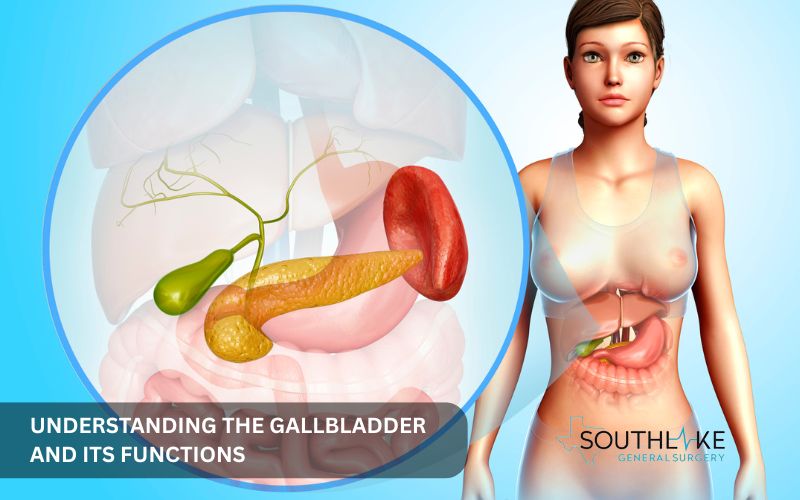
The gallbladder is a tiny, pear-shaped organ located under the liver. It maintains the digestive fluid bile, which is produced by the liver. Bile being released into the small intestine is super important for breaking down the fats we eat. Even though it is small, the gallbladder is important for digestion and for handling fatty nutrients.
Imbalances in bile can cause gallstones or inflammation. A balanced diet is essential for gallbladder health and digestive support. This eating plan ought to be rich in fiber, nutritious fats, and lean sources of protein.
Role of the Gallbladder in Digestion
The gallbladder plays a crucial role in facilitating the coordination of other organs for effective digestion. It is especially crucial when it comes to breaking down fats. Here are the main jobs of the gallbladder in digestion:
- Bile Storage: The gallbladder is like a tiny storage space for bile. Bile has bile salts that help break-down fats into smaller pieces. This approach helps enhance how well the small intestine absorbs nutrients.
- Bile Release: Every time you eat, the gallbladder passes bile through the bile duct and into your small intestine. This action is important for your body to digest fats well.
- Nutrient Absorption: The bile helps absorb essential fatty acids and aids in using fat-soluble vitamins A, D, E, and K.
- Potential Issues: If bile does not flow correctly, it can cause problems like stomach pain and a lack of nutrients. If gallbladder function is affected by gallstones or other conditions, the bile ducts can get blocked, leading to issues such as biliary colic or inflammation.
To keep your gallbladder healthy, it is important to eat a diet full of nutrients. You should also think carefully about your meal planning.
Common Gallbladder Issues and Symptoms
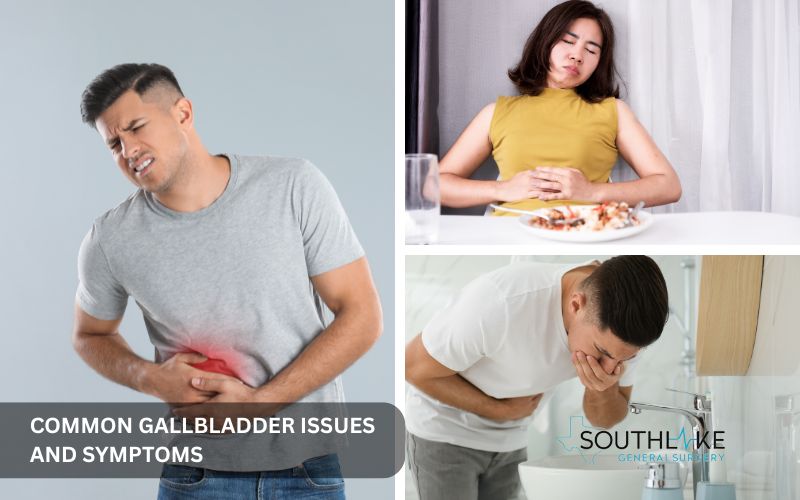
Gallbladder problems can happen due to several reasons. Possible factors could involve gallstones, inflammation, or obstructions in the bile duct. Some common issues and symptoms are:
- Gallstones: These are solid formations that develop from cholesterol or bile salts. They have the potential to block the bile ducts.
- Symptoms of Gallstones: You may feel severe pain in the upper right side of your stomach. Other signs include bloating, nausea, and vomiting, especially after eating fatty foods.
- Cholecystitis: This happens when the gallbladder becomes inflamed or swollen. It can make gallstone pain worse.
- Symptoms of Cholecystitis: You might have a fever, jaundice, or stomach problems. If these issues are not treated quickly, they can lead to serious problems, such as infections or pancreatitis.
Seeing symptoms related to the gallbladder early can help you get medical help. It also allows you to change your diet. Eating less fatty foods is important. Adding foods that are good for the gallbladder can help lessen symptoms and make digestion better.
Recommended Foods for Gallbladder Health
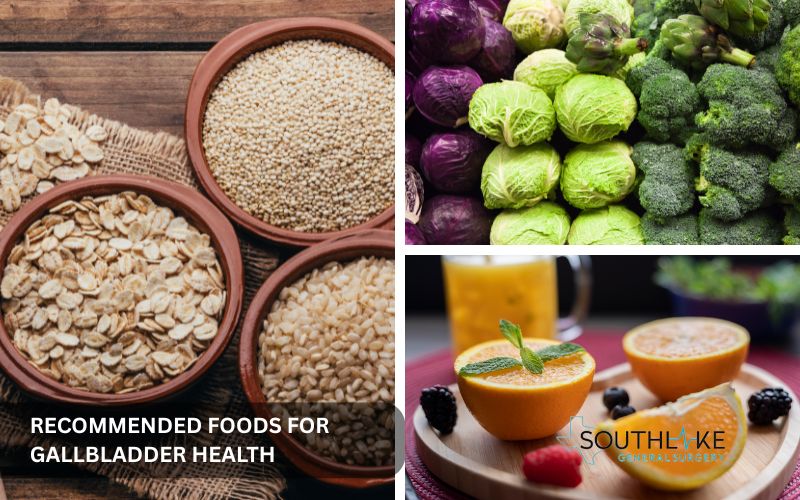
Some foods can really help with digestion and are great for your gallbladder health. High-fiber vegetables, fruits, and whole grains allow food to move easily through your digestive system. This might help reduce stress and could even assist in preventing gallstones. Lean proteins like fish, tofu, and skinless chicken give essential nutrients without putting extra pressure on bile production.
Healthy fats from sources such as olive oil and avocado help improve bile quality. They also promote the gallbladder to contract. Adding these foods to your diet can help protect you from gallbladder disease. This action supports your long-term digestive health.
Fiber-Rich Foods: Fruits, Vegetables, and Whole Grains
Fiber is crucial for healthy digestion. It can also lower the chance of gallstone disease. Eating foods high in fiber helps food move through your intestines quickly. This speeds up digestion and helps the bile flow more easily.
A few examples of foods that are rich in fiber are:
- Whole grains: Quinoa, barley, brown rice, oats, and bread made from whole wheat.
- Fruits: Raspberries, guava, and citrus fruits like oranges and lemons.
- Vegetables: Broccoli, artichokes, and green peas.
People should aim to have at least 28 grams of fiber every day. A steady amount of fiber can lower the risk of gallstone disease. It also helps the gallbladder function better.
Lean Proteins: Fish, Chicken, and Plant-Based Sources
It is important to keep a high protein intake and choose low-fat options for good gallbladder health. Here are some lean protein sources you can consider:
- Fish: White fish, like halibut, is full of nutrients. It has omega-3 fatty acids that help your bile function better.
- Skinless Chicken: Picking skinless chicken cuts lowers fat and keeps essential proteins.
- Plant-Based Choices: Think about eating lentils, beans, and tofu. They offer good protein without putting pressure on bile production.
Eating lean proteins helps fix tissue and supports digestion. They play an important role in preventing gallbladder problems.
Healthy Fats for Gallbladder Diet: Avocado, Nuts, and Seeds
Healthy fats are beneficial for your body. Eat avocados, nuts, and seeds for a good source. They aid in the contraction of the gallbladder and maintain proper bile acid regulation. Unlike saturated or trans fats, these monounsaturated fats improve bile and lower cholesterol levels.
- Cook it with sunflower oil and olive oil because they have lots of unsaturated fats.
- You can add almonds, pumpkin seeds, and pecans to your meals or snacks. They are a good choice for gallbladder health.
Some people find that switching from animal fats to plant-based fats helps with digestion. This may reduce the possibility of gallstone formation.
Regular and frequent mealtimes
Eating meals at regular times can help your gallbladder function well. It helps produce a steady flow of bile. When you eat on a schedule, your gallbladder sends out bile more frequently. This practice can prevent bile from getting stuck, reducing the chance of gallstone formation.
- Eating smaller meals more often is good for digesting the right amount of fat.
- This helps lower the load on bile salts and your digestive system.
- It can also help reduce symptoms of gallbladder problems.
Eating regularly helps prevent the sudden buildup of bile. This practice keeps your gallbladder working well over time.
Foods to Avoid or Restrict If You Have Gallstones
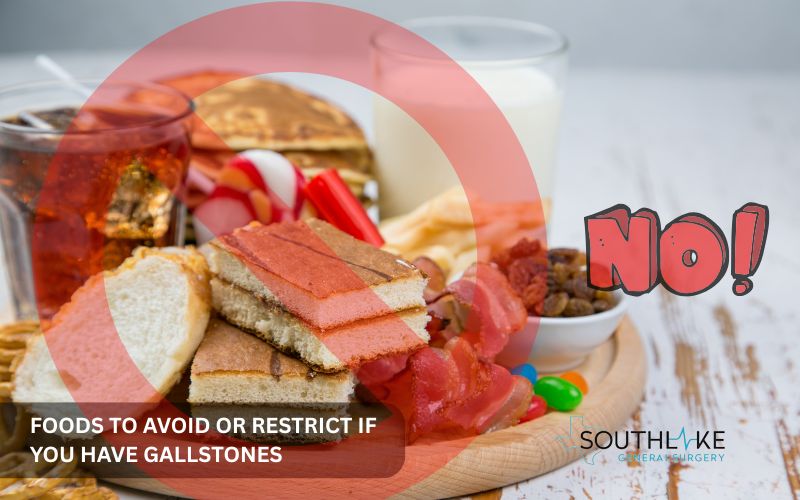
Some foods can hurt the gallbladder or cause gallstones. Foods that are high in fat, like red meat, full-fat dairy, and fried items, can disturb how bile works. Inflammation and pain could result from this.
Avoid processed foods that have a lot of refined sugars and unhealthy fats. Cutting down on these foods can assist the gallbladder in healing and reduce flare-ups of food intolerance.
Effects of Consuming High-Fat Foods on the Gallbladder and Gallstones
Eating fatty foods can make the gallbladder work much harder. This may cause pain or swelling. A good idea is to replace dairy products, like cream and butter, with low-fat options to help with digestion. Consider these points:
- Red meat contains a lot of fat. This might make it tough for the bile to do its job right.
- Choosing lean meat or plant-based proteins is better for the gallbladder. The organ may find it easier to function with its help.
- Reducing fatty foods helps keep bile salt healthy. This may prevent issues like gallstone formation or blockages in the ducts.
Processed Foods and Sugars: What to Watch Out For
Highly processed foods can hurt your gallbladder health. This is especially true for those with a lot of sugar. These foods often do not have fiber and are very high in calories. Some common examples include:
- Tasty baked treats such as cookies and cakes.
- Quick meals like burgers and fries.
- Ready-to-eat meals are packed with refined sugars and trans fats.
If you replace these with healthier choices, you can reduce the risk of gallbladder disease. This can help with your digestion in the long run.
Dietary Tips Post-Gallbladder Surgery
Once you’ve had your gallbladder removed, it’s a good idea to tweak your diet a bit to avoid any stomach problems. Eating foods that are high in fiber, such as oats and whole grains, can help reduce problems like bloating and diarrhea after the surgery.
Eating smaller meals several times a day can help your body take in nutrients more effectively. For specific post-op instructions, it’s best to talk to your surgeon.
Adjusting Your Diet After Gallbladder Removal
Bile is sent straight to the small intestine following gallbladder removal. This can lead to gas and diarrhea at times. To support your digestion, try adding more dietary fiber to your meals slowly.
Avoid high-fat foods, such as creams and gravies. They can cause irritation. Eating lean proteins is a good way to balance your nutrition. Also, having smaller meal portions can help control the bile flow and improve digestion over time.
Drinking enough water is important for recovery. It also helps bile work better after a cholecystectomy.
Essential Nutrients and Supplements
Vitamin C comes from citrus fruits like oranges and grapefruits. Both your cholesterol levels and the health of your gallbladder are supported by this. After surgery, eating foods that are high in antioxidants can help improve bile health.
If you are not getting enough Vitamin C and magnesium from your food, supplements can be helpful. It is a good idea to talk to a doctor before starting any new supplements.
Taking multivitamins that are fortified gives full nutritional support. This helps in recovering the gallbladder and keeping it working well.
Conclusion
Keeping your gallbladder healthy is super important for digestion to work well. A balanced diet with high-fiber foods, lean proteins, and healthy fats helps the gallbladder work well.
Choosing nutrient-rich options like whole grains, avocados, and legumes can lower the risk of gallbladder disease. It’s really important to keep an eye on processed foods, sugars, and those high-fat things like red meat and fried foods. This might help keep inflammation at a distance and lower the chances of dealing with symptomatic gallstone disease.
Making small changes and knowing your personal risk factors can help improve gallbladder health. If symptoms continue or if you have gallbladder problems, it is important to see a gastroenterologist. In the end, choosing the right foods can lead to a healthier gallbladder and better overall well-being.
Make an Appointment
For help with your gallbladder health and creating a good gallbladder diet, meet with Dr. Valeria Simone, MD, at Southlake General Surgery. She specializes in gallbladder disorders. Dr. Simone can provide personal advice that focuses on a balanced diet. You may lessen your chances of getting gallstones by following these suggestions.
Call the office at +1 (817) 748-0200 to discuss your symptoms. You can also find out about treatment options, including dietary changes that can improve gallbladder function and your overall wellness.
Frequently Asked Questions
How can I maintain a healthy gallbladder through my diet?
A nutritious diet for your gallbladder features an abundance of fiber-rich vegetables, whole grains, and healthy fats, such as olive oil. You should also eat lean proteins, such as fish and tofu. Maintaining regular meal times throughout the day is crucial. This approach helps in digestion and promotes the well-being of the gallbladder.
How does diet influence gallbladder pain?
Diet plays a big role in gallbladder health. Eating a lot of fatty and processed foods may cause inflammation and pain. If you choose high-fiber and nutritious foods, it can ease the pressure on the gallbladder. Making this choice could help reduce discomfort.
Medically Reviewed By: Dr. Valeria Simone MD
Board-certified General Surgeon at Southlake General Surgery, Texas, USA.
Follow us on Facebook and YouTube.
References:
- Johansson K, Sundström J, Marcus C, Hemmingsson E, Neovius M. Risk of symptomatic gallstones and cholecystectomy after a very-low-calorie diet or low-calorie diet in a commercial weight loss program: 1-year matched cohort study. Int J Obes (Lond). 2014 Feb;38(2):279-84. doi: 10.1038/ijo.2013.83. Epub 2013 May 22. PMID: 23736359; PMCID: PMC3921672.
- Wirth J, Song M, Fung TT, Joshi AD, Tabung FK, Chan AT, Weikert C, Leitzmann M, Willett WC, Giovannucci E, Wu K. Diet-quality scores and the risk of symptomatic gallstone disease: a prospective cohort study of male US health professionals. Int J Epidemiol. 2018 Dec 1;47(6):1938-1946. doi: 10.1093/ije/dyy210. PMID: 30312404; PMCID: PMC6280928.
- Chang CM, Chiu THT, Chang CC, Lin MN, Lin CL. Plant-Based Diet, Cholesterol, and Risk of Gallstone Disease: A Prospective Study. Nutrients. 2019 Feb 4;11(2):335. doi: 10.3390/nu11020335. PMID: 30720747; PMCID: PMC6412457.
- Di Ciaula A, Garruti G, Frühbeck G, De Angelis M, de Bari O, Wang DQ, Lammert F, Portincasa P. The Role of Diet in the Pathogenesis of Cholesterol Gallstones. Curr Med Chem. 2019;26(19):3620-3638. doi: 10.2174/0929867324666170530080636. PMID: 28554328; PMCID: PMC8118138.

